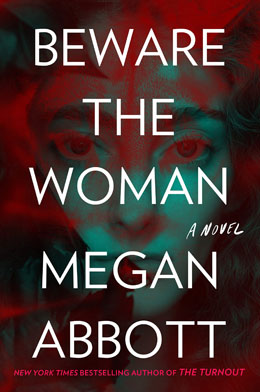Megan Abbott is an author whose career is the envy of other creative types. In a writing journey that spans twenty plus years, Abbott has written novels, short stories, non-fiction, screenplays, graphic novels, and more—each of them unique, but containing that singular “Megan Abbott essence” that distinctively marks her work and highlights it for her devoted fan-following. Her upcoming noir masterpiece, Beware the Woman, is both unlike anything she has written before and a perfect complement to her existing work. In short, it is a natural progression in the evolution of her writing brand. And it is guaranteed to please both her existing fanbase and those who discover her work with Beware the Woman.
Beware the Woman is clearly influenced by Megan Abbott’s love of film noir and its sister-genre, the Gothic. The tropes of these genres weave themselves through Beware the Woman in traditional ways, but with unexpected twists that only an aficionado could successfully pull off. One of the most prevalent elements—the idea of gaslighting—imbues every word of Beware the Woman, while always leaving the reader in doubt about its validity. It’s almost as though Megan Abbott has managed to gaslight the reader, taking their expectations and manipulating them in the best ways possible.
Jed and Jacy are a newly married and newly pregnant couple traveling to spend the Fourth of July holiday with Jed’s widowed father, Dr. Ash. The timing—during the first trimester of pregnancy—seems the most risk-free and Jacy is excited to have the opportunity to bond with her father-in-law. However, the closer they get to the isolated home where Jed grew up, the more stressed he seems to get. Chalking it up to nerves, Jacy does her best to soothe the tension and by the time they arrive, things are back to normal.
The days pass with meals together—often prepared by the mysterious housekeeper, Mrs. Brandt, who does not dine with the family—and short excursions exploring the sometimes-dangerous woods and other environs surrounding the quaint homestead. When Jed runs into an old friend, Jacy is the first to encourage the two to have a “guy’s night” at a local bar, while she stays home and gets to know Dr. Ash a bit better. Talking with her father-in-law, Jacy hears of how Jed’s mother died in childbirth, and she suddenly begins to understand Jed’s ever-present nervousness. Everyone’s anxiety level ratchets up after some minor bleeding sends Jacy to the local hospital, ending with a suggestion of several more days of bedrest and low activity. At this point, Jacy comprehends just how isolated she is from her own mother, her own doctor, and the life they left behind for this brief holiday.
Readers will most certainly see echoes of Daphne du Maurier’s Manderley in the way Jacy’s new environment is described. Couple that with Mrs. Brandt—whose literary DNA harkens back to Mrs. Danvers—and any reader would be forgiven for thinking they know where this story is headed. But remember, this is Megan Abbott, and she is not going to tread completely into the waters of an iconic classic like Rebecca. However, this is a great short-hand way to alert readers of the tone and atmosphere of that permeates Beware the Woman. Juxtaposed with the constant feeling of unease are erotic moments that sizzle, feeling almost too intimate. Both Jacy’s surface vulnerability and her underlying power leap from the page into the consciousness of the reader—a battle royale that feeds the narrative.
Unlike with her other novels, Megan Abbott has written much of Beware the Woman—especially in the first half—in episodic vignettes that feel ephemeral and dreamlike as the full mosaic slowly comes to fruition. In fact, dreams (or are they hallucinations) are a recurring motif throughout the novel and are part of the reason reader’s sure-footedness is always in question. Abbott’s ability to craft moments that seem both sensual and macabre in tandem borders on the poetic. Beware the Woman could easily have devolved into an attack on toxic masculinity alone, but Megan Abbott wants her readers to feel the world’s menace from all angles—natural and fabricated. Beware the Woman unspools in a hypnotic way, keeping readers under its spell even when they are not actively turning its pages. To read it is to remember it—Megan Abbott’s Beware the Woman is a work that is not to be forgotten.

Pre-Order Links: Beware the Woman by Megan Abbott
Disclaimer: An early e-galley of this title was provided to BOLO Books by the publisher. No promotion was promised and the above is an unbiased review of the novel.
